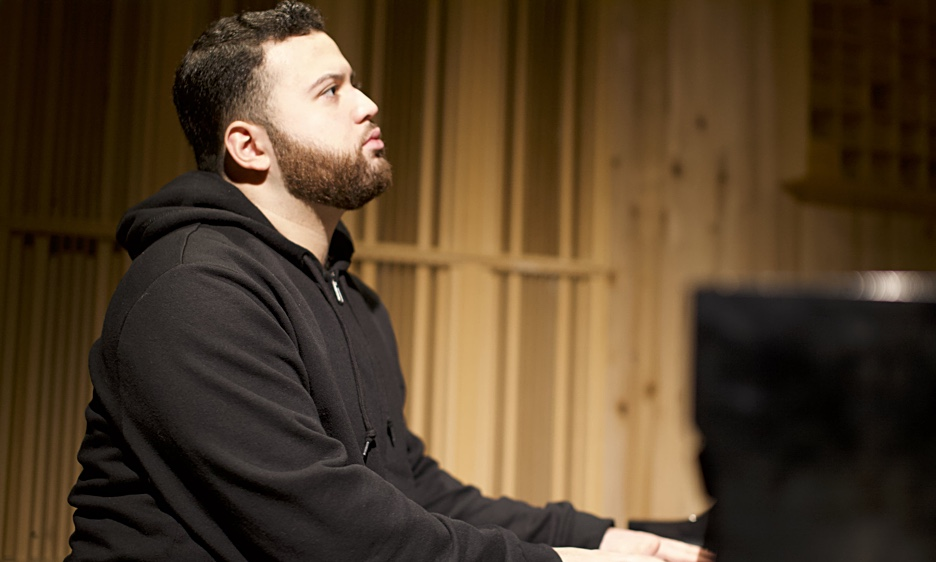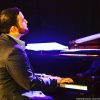Home » Jazz Articles » Take Five With... » Take Five with Marcio Garcia
Take Five with Marcio Garcia

Marcio Garcia is a Dominican pianist, composer and educator. From a very young age Marcio showed passion for music and began formal studies in classical piano at age seven in his hometown Santo Domingo.
After finishing high school and early musical studies in the Dominican Republic, Garcia went to the United States to continue his studies at the Lamont School of Music, University of Denver, where he completed a BM in classical piano performance and MM in jazz performance. Garcia also studied classical piano in Vienna, Austria as part of the Cherrington Global Scholars Program. In 2015 Garcia moved to New York to pursue an Artist Diploma in Jazz Studies at the SUNY Purchase Conservatory of Music.
Garcia has performed at the Monterey Next Generation Jazz Festival, Five Points Jazz Festival, Denver's premier jazz clubs Dazzle and Nocturne, Carnegie Hall, Blue Note NYC, The Bitter End, Birdland and Dizzy's Club Coca-Cola at Lincoln Center. He's also performed live on KUVO 89.3 Studios in Denver, Colorado and WBGO Jazz 88.3 New York. Other notable performances include DEVO co-founder Mark Mothersbaugh's original six keyboard project "Myopia," and Viktor Kiraly (NBC The Voice 2015 -Top 24).
Garcia currently resides in New York City.
Instrument(s):
Piano and keyboards
Teachers and/or influences?
I've had the opportunity to study with pianist Eric Gunnison, who worked with Carmen McRae between '86-91. I also met pianist Taylor Eigsti while he was on tour in Colorado and I was finishing my undergraduate degree in classical piano. Taylor has a very unique approach to music, and I've been going back to him as a source of information ever since. I've also been very lucky to study with David Hazeltine, Kevin Hays, Eldar Djangirov and Andy LaVerne.
Jazz pianists who are major influences, in no particular order: Keith Jarrett, Barry Harris, Chick Corea, Herbie Hancock, Sonny Clark, Cedar Walton, Michel Petrucciani, Hank Jones, Bill Evans, Bud Powell.
I knew I wanted to be a musician when...
I started playing by ear from a very young age; I naturally gravitated towards creating sounds. I wasn't thinking of it as a career, but rather as something very natural that I just had to do, and I still approach it the same way.
Your sound and approach to music
I'm strongly influenced by Impressionism and French composers Maurice Ravel and Claude Debussy. I believe the acoustic piano has a unique ability to convey and stimulate emotions in a way that no other instrument can. My approach is to always be true to the intention of the music, regardless of judgment or where the performance might take place.
Your teaching approach
I love teaching! I currently have a pretty packed studio of private students in New York City and am a firm believer in both inspiration and habit. Inspiration in terms of naturally gravitating towards exploring sounds and being curious about them: this is then combined with habit, which helps in developing self-discipline. I always try to make the student's musical inclinations a priority, as it always keeps them engaged and eliminates this idea of practicing as some sort of chore.
Road story: Your best or worst experience
I had an awesome experience working with DEVO's co-founder Mark Mothersbaugh in Denver, Colorado. I was part of a six-pianist ensemble that played this crazy six-sided organ that Mark designed for several performances throughout Denver as part of his "Myopia" art exhibit. It was an awesome experience and the other pianists involved in the project are very good friends of mine, so we had a big sense of community and appreciation for each other: there are a few videos and press information on YouTube and Colorado Public Radio online if anyone wants to check the performances out. We even played some of the music from The Life Aquatic with Steve Zissou, as Mark composed the music for that movie and a few other Wes Anderson films.
What do you think is the most important thing you are contributing musically?
I'm hoping my latest record, Forest motivates pianists and composers to explore new musical directions when expressing their ideas and helps them get away from a self-centered approach to composition and performance.
What are some of the essential requirements to keep jazz alive and growing?
It needs to keep evolving! "Alive" and "growing" equates to forward movement, not backpedaling.
What is in the near future?
Taking my new production, Forest to as many audiences as possible!
What is your greatest fear when you perform?
Overthinking. When you're inside your head and you forget what the intention of the music is, it can distract you from a successful performance. You have to really trust the work you've put in so that you can let go of the ego and convey ideas clearly.
If I weren't a jazz musician, I would be a:
Still an artist, but would channel ideas through another medium, perhaps film.
Why music?
As we rely on technology more and more, we tend to forget the importance of the role of the artist in society. Through music, I am doing my best to remind people that we have feelings: machines can't connect with people the way artists can. Music has a way of finding its way into our innermost self to help us align our personal discrepancies.
Music doesn't have to be an indulgence, or a luxurious product: it's an essential communication tool for human survival. Music helps our hearts understand things when our minds can't, so I strive to create awareness that artists can be as powerful as doctors; we are healers of the soul.
< Previous
Arpeggio Jazz Ensemble "Bebop" Concer...
Next >
Forest
Comments
Tags
For the Love of Jazz
 All About Jazz has been a pillar of jazz since 1995, championing it as an art form and, more importantly, supporting the musicians who create it. Our enduring commitment has made "AAJ" one of the most culturally important websites of its kind, read by hundreds of thousands of fans, musicians and industry figures every month.
All About Jazz has been a pillar of jazz since 1995, championing it as an art form and, more importantly, supporting the musicians who create it. Our enduring commitment has made "AAJ" one of the most culturally important websites of its kind, read by hundreds of thousands of fans, musicians and industry figures every month.























